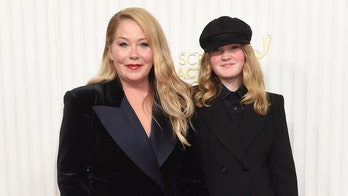Fox News Flash top headlines for May 28
Fox News Flash top headlines are here. Check out what's clicking on Foxnews.com.
You don't initially see a full elephant at the Broadway musical "Water for Elephants." It's more like a tease. First come a pair of enormous ears. Then a trunk. And then the legs.
The execution is by director Jessica Stone, who wanted to make it extra special for the audience when they finally get to see the big reveal at the end of Act 1. She thought it had to be awe-inspiring, tender and the spirit of an elephant.
"People were talking about how moved they were when they finally were seeing her in full and I was like, ‘OK, I think it’s going to be OK,’" Stone says.
It's been more than OK for Stone, whose show earned seven Tony Award nominations, including one for best new musical and one for her heroic efforts to seamlessly create a big Broadway musical with elements of circus.

Jessica Stone attends the Broadway opening night for "Water For Elephants" at The Imperial Theatre on Thursday, March 21, 2024, in New York. (CJ Rivera/Invision/AP)
Stone knits puppets and vaudeville acts, songs and somersaults, as well as melds two groups of people who might not have shared a lunch table in high school — the jocks and the theater geeks.
"It’s a very humble, disciplined, hard-working, loving cast," she says. "I overuse this metaphor, but it couldn’t be more true: We literally and figuratively hold out our arms and catch each other."
The show — adapted by Sara Gruen’s popular 2006 historical romance novel and with music by the band PigPen Theater Co. — follows a love triangle in a traveling circus during the Depression.
The New York Times called it "a stunning, emotional production that "leads with movement, eye candy and awe." Variety raved that Stone brought "it all under one spectacular tent without forgetting its human — and animal — hearts."
Her skill is on show with the first big song — "The Road Don’t Make You Young" — a nine-minute, upbeat number that involves 23 performers, singing, dancing and flipping. It leans on circus designer Shana Carroll, who co-choreographs with Jesse Robb, both who also earned Tony nods.
The number starts with a circus train coming into town, and the audience learns about each of the characters as they get off and raise a tent. Soon we’re in the middle of a circus act, with acrobats flying through the air, twisting on ropes and poles.
That took two years to develop, and Stone calls it "the gate to the rest of the show." She credits producers for giving her team the time to create it and to figure out the way to marry Broadway timing to circus.
"You actually have to have a little wiggle room for circus because you don’t fly through the air on the exact same counts every single time," she says. "So everywhere throughout the show and the number, there’s always a little bit of wiggle room. We’ve had to build it in for safety."
Rick Elice, the playwright of "Jersey Boys" and "Peter and the Starcatcher" who earned a Tony nod for "Water for Elephants," said he was intrigued when Stone auditioned as director and spoke her mind even about elements that seemed non-negotiable, like his initial framing device.
"She’s brilliant. She’s funny. She’s totally prepared. She’s fast on her feet. She’s somebody that you just love to have lunch with because you laugh a lot and you bat ideas back and forth, which to me is a great lunch," he says.
"Water for Elephants," framed as an elderly former circus worker fondly looking back, joins a raft of recent memory plays on Broadway like "Mother Play," "The Notebook,""A Beautiful Noise" and "Harmony."
"It’s not like we all got in a room and said, ’You know what? 2024 is going to be the memory season," she says with a laugh. She thinks it’s a byproduct of the pandemic.
"Memory plays have to do with looking back on your life and determining whether or not you did it right, and whether or not you’re still doing it right," she says.
That became the key to how to marry circus elements in "Water for Elephants" — they are hazy memories for the main character, fragmented and not fully formed.
"I really didn’t want people arbitrarily peeling off into back handsprings for no reason. It had to really honor his most, important memories," Stone says.
"Once you realize you’re looking at it through that prism, you don’t really want to see a literal animal. Go to the zoo if you want to see a literal animal. What you want to see is a fragment."
So, a lion is presented as just a head and a jaw and a horse in pain is shown by a mask in an actor's lap while French performer Antoine Boissereau elegantly swings high from a white cloth, the spirit of the animal drifting between life and death.
Stone was an actor on and off-Broadway, in television and in film, for decades before transitioning to directing. She previously earned a Tony nod directing the Tony-winning Broadway musical "Kimberly Akimbo," which beautifully captured sadness with humor.
"That dichotomy is the thing that’s most interesting to me — that you can feel great pain and still something can really make you laugh in that moment. That’s something that I seek when I’m telling stories."
Elice says Stone's background as an actor gives her an ability to know how to talk to actors, comparing her favorably to the late, great Mike Nichols, which is saying a lot.
"I’ve never seen anybody better than Nichols talking to actors. She just has the knack of being able to cut through a lot of b.s. and say exactly the right thing to get a great performance."
Stone is part of a sisterhood of directors who crashed through a Broadway barrier this year: Seven women took the 10 musical and play directing nomination slots. Only 10 women have gone on to win a directing crown.
CLICK HERE TO GET THE FOX NEWS APP
Stone, who is married to Broadway veteran actor Christopher Fitzgerald, celebrated her nomination in a very New York way: She got an everything toasted bagel with cream cheese and a manicure.
That's in keeping with a director who likes to leaven something profound with something ordinary. "You can be nominated for an award and just want a bagel," she says, laughing.















































